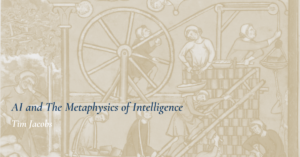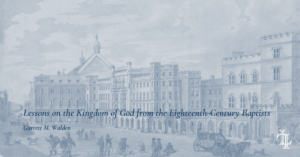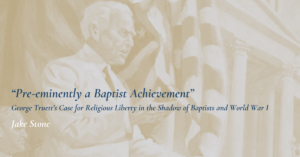Not long ago, I was reading a book examining some not-so-great features of modern evangelicalism (hint: it was Jesus and John Wayne). I really wanted to learn from the book, so I read with an open mind and a critical eye. Surprisingly to me, the most profound lesson I learned was that the task of writing history is far more complex than is sometimes granted. While I disagreed with many of the author’s interpretive and theological judgments, I couldn’t quite put my finger on what about the book’s historical methodology sat so uncomfortably with me. That sent me down a path of learning about historiography.
Around the same time as my inquiry began, The London Lyceum began a brief symposium on “Historical Methodology and Activism,” with three essays:
- “When Activists Do History” by Alex DiPrima
- “A Christian Case for Activist History” by Daniel K. Williams
- “Evangelical History Overturned” by D. G. Hart
In this summative essay, I will briefly summarize the points of agreement and disagreement expressed in the essays above, and I will offer a brief review of a book that addresses this subject in a way that I think is best.
Alex DiPrima’s Contribution
DiPrima’s essay was the first in the series and sparked some considerable chatter online. The core of his concern is that there exists an ideal “traditional scholarly approach to writing and teaching history,” and the contemporary historical guild has opted for “activist historiography” instead. He defines “activist historiography” as a combination of historical narrative and advocacy for certain pop-cultural ideas. He gave examples such as the 1619 Project, Jemar Tisby’s The Color of Compromise, and Beth Allison Barr’s The Making of Biblical Womanhood, among others. The latter two write as professing Christians and identify their work as a form of activism. DiPrima is concerned about this because “they both aim to utilize history to advocate for social change and for particular political and cultural agendas.” This foregrounding of activism instrumentalizes, obscures, and thus compromises the integrity of the history.
DiPrima said, “the historian’s task is essentially to tell the world what happened in as fair, objective, and unbiased a manner as possible,” “to provide an accurate telling of what happened in time and space,” and to begin with “a non-partisan investigation into the facts of history.” Because of this goal, a preconceived agenda only serves to distort history. Even so, he admits that “history can never be a purely objective endeavor…there is a sense in which no account of history can be completely unbiased.” However, there are “objective principles of historical inquiry” which include the responsibility “to eliminate, or at least minimize their own bias and their own moral intuitions and judgments.” All of this was set by him in contrast to “activist historiography” which “weaponizes history to advance a particular political, social, or polemical agenda.” Activist history doesn’t search for truth but for “a particular historical narrative that will serve the cause” and “compromises the discipline of history itself.”
Much of DiPrima’s point hinges on his operative definition of history: “History tells the story of what happened and how it happened. It is inherently a descriptive discipline, not prescriptive.” Any application of historical investigation by politicians, activists, and theologians can be valid, but then it is no longer history but something else. This is the biggest problem to DiPrima: activist historians are not often forthright about their agendas, and the reader thinks he or she is reading history when it is in fact propaganda. DiPrima is right to acknowledge that activist historiography occurs among theological and political progressives and conservatives, and it serves to galvanize the tribes, exacerbate social maladies, and provide only a distorted education
I believe DiPrima is on to something in his essay. One of his suggestions for correcting this error is for established historians to identify this kind of historiography and expose its shortcomings. Surely this kind of critical dialogue between scholars is not too much to ask. Yet, the point DiPrima made in his article was practically proven by the online buzz that followed its publication: to question the legitimacy of activist historiography is offensive and places the critic on the opposite side of the social issue being addressed by the activist historian. Surely this intolerance of meaningful critique signals something amiss in the discipline.
Daniel Williams’s Contribution
Williams responded to DiPrima’s essay to defend “activist historiography” from a historical and biblical perspective. He claimed that DiPrima’s view of history “is rooted in nineteenth-century assumptions about neutrality and objectivity that many professional historians have abandoned.” I imagine DiPrima might concede this point and note that these professional historians have abandoned this view to the detriment of the discipline. Nevertheless, Williams outlined that for more than 2,500 years, historians were explicitly and unashamedly motivated by agendas political and otherwise. Ancient cultures wrote about military conquest that maximized their successes and minimized (or omitted entirely) their failures. The biblical narrative follows a similar pattern, says Williams, but with God as the hero. He admits that “the Bible’s historical record of its monarchs provides lengthy coverage of each of the kings’ failures, because the purpose of the record was to celebrate God’s glory, not the king’s.” Much of Western and Christian history followed suit, explicitly locating personal and civic activity in the context of God’s story of redemption.
However, all that changed in the nineteenth century, and the root can be traced (unsurprisingly) to Germany. Historians like Leopold von Ranke and Wilhelm von Humboldt “professionalized the craft of historical inquiry and challenged traditional assumptions about the purpose of historical writing.” In other words, it developed into a science with necessary “rules of evidence and interpretation.” Williams located DiPrima (and those DiPrima cited as exemplars) in this stream and notes that their historical methodology was “near-universal in the historical profession from the 1820s through at least the 1960s.”
What changed? Why did the historical guild largely abandon this Rankean view of history? Williams says that in the 1960s and 1970s, the social unrest surrounding the Civil Rights Movement and the Vietnam War shaped a generation of historians who desired to emphasize “the lives of the less privileged, a move that challenged the power structure, just as the civil rights movement had.” Therefore, “social history replaced political history as the dominant historical genre in the academy. All historical studies, whether political or not, had to take account of race, class, and gender as primary categories of analysis.”
Many contemporary historians say that objectivity in historical writing is not even possible and that those who hold to something like a Rankean view aren’t actually as objective and scientific as their theory demands. What makes a work of history trustworthy is less about a claim to neutrality or objectivity and more about the honesty and integrity of the historian’s use of the sources. DiPrima claimed that the problem is that activist historians aren’t so transparent and thus the reader is in danger of being manipulated.
Williams concluded with the encouragement that Christian historians may write history from a distinctly Christian foundation, which in the eyes of many will be viewed as “activist” or “biased.” Even if such works aren’t overtly evangelistic or driven by an expressly theological agenda, they may ask questions and analyze resources that reflect the values of the Christian faith and experience. He suggested that historians like Tisby, Barr, and Kristin Du Mez are doing such work and that their work has landed uncomfortably within some segments of evangelicalism because evangelicals are unfamiliar with (or too readily dismiss for ideological reasons) this mode of historical inquiry. In other words, you may not like it or agree with it, but it is a legitimate mode of historiography, well-acknowledged and nearly universally accepted by the guild. Even if you disagree with their conclusions, Williams writes, these “activist historians” are following a biblical example and methodology of writing history (e.g. 1 and 2 Chronicles) with the aim to convict God’s people of sin, to indict the powerful, to lift up the oppressed, and even to explain why divine judgment has fallen on a nation or group of people. So, rather than critique their method and conclusions, perhaps the more productive focus of critique should be their storytelling and use of sources.
Darryl Hart’s Contribution
Hart began his essay by assessing some historical works about evangelicals as a subgroup of the political and religious landscape. The fact that evangelicals could unite behind political candidates and form powerful intellectual societies to advance causes that aligned with their values makes them a fascinating and complicated historical subject. These institutional associations also open them up to ideological distortions, depending on who’s telling the story. The remainder of his essay surveys some of the literature about evangelicals published since the election of Donald Trump. That watershed event has transformed the way historians view evangelicalism. He notes that many of the recent assessments were written by the former students of eminent historians such as Mark Noll, George Marsden, Nathan Hatch, and Joel Carpenter, but this new generation rejects some of the guiding principles of their fathers in the discipline.
Part of this shifting posture toward writing about evangelicalism centers on redefining the notion of evangelicalism as a sociological phenomenon rather than as an expression of religious belief. He observes that the re-telling of evangelical history is staggering. No one says it directly, perhaps because of the etiquette that informs advisor-advisee relationships, but the pressing question is: how could Marsden, Noll, Hatch, and others have been so wrong? What blinded them to these other features of evangelicalism that it turns out were not simply part of the human condition but the very substance of evangelicalism itself?
As it turns out, in Hart’s view, evangelical support for Donald Trump was the match to the powder keg. I believe Hart is right to identify the “opportunism” of the post-Trump market as a major contributor to this shift in historiographical priority. He wrote, “The historians that featured Trump in their analysis took advantage of a market and set of gatekeepers (editors and journalists) eager for material that elaborated how bad support for the president was.” Like it or not, this mode of history sells.
Hart’s analysis does not necessarily blaze a new trail but surveys some of the major pieces of the literature, showing that something significant has changed. The catalyst was the Trump phenomenon, and the historical guild and the market that supports it seems almost unanimously to have aligned leftward (or at least somewhere in the vast expanse to the left of MAGA Trump supporters). As a result, these political-historical presuppositions are privileged, and many of the evangelicals who find themselves treated as a single Trump-supporting unit disapprove of this way of writing about evangelical history. The political moment has seen the language of “It’s a feature, not a bug,” become prevalent to tell evangelicals what they think and to prove that some of the most regrettable moments in the recent past are the outworking of what has been latent all along. Hart seemed to say that that assessment betrays a very recent shift of perspective and may reflect a pandering to the contemporary historical guild and popular market rather than an honest assessment of the sources.
Learning from Ian Clary’s Search for a Usable Past
Each of the authors above are to be commended for their contributions to the discussion. Long-form essays which grant the ability to interact thoughtfully are surely better modes of engagement than rallying the base on Twitter. And if an online essay symposium allows for meaningful and knowledgeable discussion, how much more a focused dissertation on such a subject! Thankfully such work has been done in one of the most helpful books I have read on this subject, which comes from Ian Clary.
Clary is associate professor of historical theology at Colorado Christian University, and his dissertation under Michael Haykin and Adrian Neele was recently published as Reformed Evangelicalism and the Search for a Usable Past.[1] The book is technical in some parts (it’s a version of his dissertation after all), but I found it to be very readable. Clary is a clear thinker, an excellent writer, and a trustworthy guide on matters of historical inquiry. The early chapters have much to do with historiography and defining terms, but the rest of the book is largely biographical, giving attention to the life and work of Arnold Dallimore as a case study of a prominent evangelical pastor-historian.
Most pertinent to the matter at hand, Clary addresses different modes of doing history in chapter 2 (a version of which he has made available for free here). As the title indicates, he is interested in “a usable past,” which is “rooted in the idea that since the past shapes the present, it can be used to inform and guide the present.”[2] A step in developing this idea required Clary to outline a taxonomy for Christian approaches to history that works better than the activist versus non-activist dichotomy. I think he offers needed guidance for the present disputation.
The question motivating Clary is this: “Is there a Christian way to do history?”[3] Clary’s short answer is “Yes,” but evangelicals are split as to how to go about the task. On the one hand, someone like Iain Murray might argue that Christians should not follow the rules of so-called academic neutrality to faithfully do history. To cede the methodological ground, in his view, is to cease to work as a Christian. On the other hand, someone like Carl Trueman might maintain that so-called objective historiography does not undermine faithfulness to Christianity. To neglect the methodological criteria for what trained scholars deem to be sound historiography is to relegate oneself to the fringes of the conversation as a promoter of mere ideology in the guise of meaningful history.
Clary surveys the last sixty or so years of Christian history societies and institutions like the Conference on Faith and History, the Christianity and History Forum, and the Evangelical History Association, and he summarizes the contributions of some of the leading scholars. Borrowing from the work of Henry Warder Bowden, Clary explains that a better taxonomy features two primary labels on a spectrum: the supernaturalist perspective at one end and the naturalist perspective at the other. Clary concludes by offering his own alternative mediating position.
First, the supernaturalists treat history under the larger category of theology and are more open to identifying “providential significance in past experience.”[4] This is sometimes called “providentialist history.” From the biblical authors like Moses and the Chronicler, to the church fathers like Eusebius and Augustine, to the Puritans like Cotton Mather, to modern writers like Iain Murray and Arnold Dallimore, providential history done with a supernaturalist perspective has been the dominant mode of Christian history. Many contemporary historians in this stream write from the locus of the church or seminary and publish with explicitly religious publishing houses.
Second, the naturalists treat history under the larger category of humanities and take a more behavioral and sociological approach to religion. Religion can be viewed as a feature of “cultural development.”[5] This group is reticent to identify divine agency as a cause of any historical event, since such an evaluation would be either impossible to prove or unpersuasive to those not already convinced. While practically all secular historiography adopts this perspective, it also supplies the methodological “toolkit” for the academic historical guild, and among many Christian historians.[6] Clary writes:
[George] Marsden argued that his work is a “study of things visible” and thus uses “the modern mode of explanation” and “natural historical causation.” This would not militate against believing that God is active in history. Rather, for Marsden, it is the theologian’s task to determine such things, not the historian’s.
To reiterate, a Christian historian can affirm divine providence yet adopt a kind of methodological naturalism for his or her historical work. For Marsden, to include God’s providence in interpreting the past is to diverge from the historian’s task and encroach on the theologian’s work. George Marsden, Mark Noll, Nathan Hatch, Harry Stout, and David Bebbington, among others, would fall into this category of evangelical naturalist historians. Many in this stream teach at major research institutions and publish with revered academic presses.
Clary seeks to chart a middle path, since it seems to him that the controlling difference between the two labels has much to do with the intended audience of the historical works. Popular history can be written in a different mode than academic history. History for the church can be written in a different mode than history written for the academy. That’s essentially the case Clary makes for Dallimore in the remainder of the book: Dallimore was writing non-academic biography for the church, and it’s not to be measured as if it were academic history for the guild. To say that someone like Dallimore’s work is non-academic does not mean it’s shabby or untrustworthy any more than a sermon is a shabby or untrustworthy kind of closing statement by a lawyer. They’re just intended for different purposes and different people. Each has its place. For that highly-contextualized reason, charging Dallimore with “hagiography” is a category error, Clary contends.
Iain Murray claimed to follow the precedent set by Luke the Gospel writer as a providentialist historian, and bid us to imagine what the naturalist historians would do with the book of Acts! But is there a biblical precedent for taking a more naturalist approach? Clary believes so. Leaning on the work of Karen Jobes, Clary argues that the book of Esther can serve as evidence that the Bible permits different approaches to religious people telling religious history. The book of Esther is unique in that it never mentions the name of YHWH, yet the Jewish covenantal worldview is everywhere present in the book. In the same way naturalist Christian historians should be able to narrate their own histories for the academy without centering, or even overtly featuring, the direct intervention of God. For an evangelical to play by the methodological rules of the historical guild does not necessarily entail a concession of their own personal religious beliefs. Similarly, the supernaturalist Christian historian can follow the rest of the biblical historical books in writing meaningful providential history for the church, as long as he or she is careful to avoid some common pitfalls like hagiography or anachronism.[7]
This emphasis on audience sensitivity helps us consider the challenge of “activist historiography.” As Hart noted, the historical guild has largely granted social and political history a significant role in what is approved (and marketed) by the academy. So, the methodological naturalism often employed by the “objective” and “unbiased” crowd is being used to write history that addresses hot-button social and political issues. Someone like DiPrima might not like the history being done, but it is still history that’s being done, even if a different kind. The heirs of Dallimore should continue to write their books. They’re a treasure to the church. While critics raise eyebrows at some of the methods or conclusions, they cannot say it’s not history. It’s just different. History just isn’t one thing.
[1] Ian Hugh Clary, Reformed Evangelicalism and the Search for a Useable Past: The Historiography of Arnold Dallimore, Pastor-Historian (Göttingen: Vandenhoeck & Ruprecht, 2020).
[2] Clary, Reformed Evangelicalism and the Search for a Useable Past, 17.
[3] Clary, Reformed Evangelicalism and the Search for a Useable Past, 24.
[4] Clary, Reformed Evangelicalism and the Search for a Useable Past, 29.
[5] Clary, Reformed Evangelicalism and the Search for a Useable Past, 44.
[6] Clary, Reformed Evangelicalism and the Search for a Useable Past, 29.
[7] Clary, Reformed Evangelicalism and the Search for a Useable Past, 57.
Author
-

Garrett Walden (ThM, The Southern Baptist Theological Seminary) is General Editor for Particular Baptist Heritage Books, in addition to serving as an editor for The London Lyceum and Hanover Press. He's also a farmer in Alabama with his wife and five kids, where he continues to serve his church and research early Baptist history and theology.
View all postsRecent Posts



